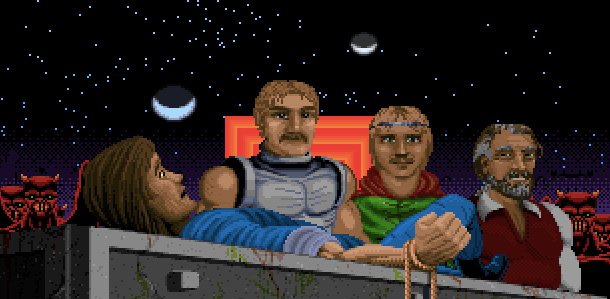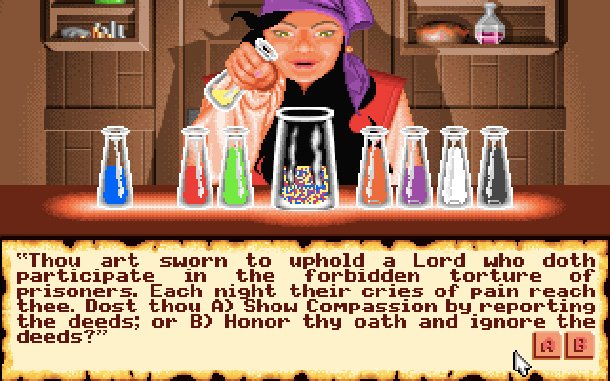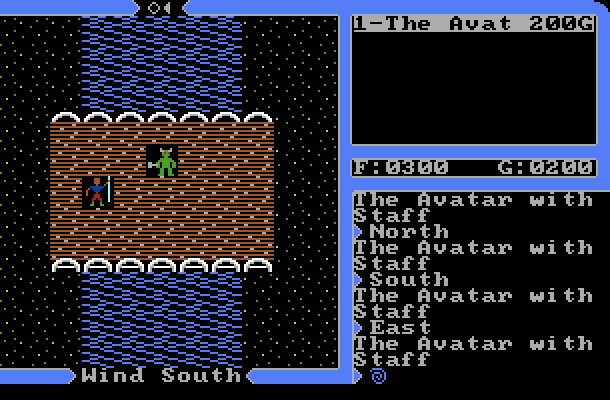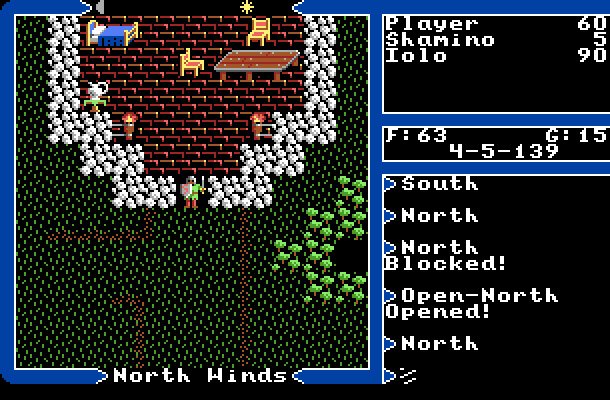Let's Reboot... Ultima

For a couple of reasons, we're going to call this one "Trial Of The Avatar" - though it takes place during one of his or her many absences from Britannia. The exact timing doesn't really matter, given that canonically Britannia was blown up at the end of the series anyway. (Consider that carefully swept under the rug.) As with Ultima Forever, and to acknowledge that Lord British is Richard Garriott's alter-ego rather than simply character, we're also putting him on a bus. Something came up elsewhere, he's disappeared, but everyone is sure that one day he will return. In his place, Britannia is ruled by a reformed Great Council - eight regents, one from each of Britannia's major cities.
The actual game is based on a few key concepts - doing good for its own sake, the fallibility of heroes, and the consequences of heroism. As the Avatar, you get a certain implied moral authority. But you're not the Avatar this time. You're just a regular Britannian - either gender, of course - growing up in the Humility focused town of New Magincia. For character creation, we see slices of that - vignettes of your upbringing where you faced situations others would walk away from, and not always in your favour. At fourteen for instance, you might intervene in a mugging in a city's alley and get a choice of intervening and buying the victim time to escape, earning yourself a thrashing, or launching an attack that leads to a few days in the cells after the victim runs and the town guard arrests everyone left.
Does that deter you? No. Because that's what the Avatar would have done.
Of course, deciding you have what it takes to be a hero isn't exactly humble, is it?

After all this, which determines character class like the gypsy in the old days, and sets a few flags to call back to later on, the game actually starts by removing those training wheels. You're now an adult, but still not willing to put 'be like the Avatar' away with your other childish things. With basic training in a suitable discipline, you head to the capital, Britain - not to seek your fortune, but your destiny. Of course, first you have to get there, and many things can happen to unwary travellers on the road...
And when you arrive, don't expect it to be as Compassionate as it claims.
Something I always hated about the later Ultima games was how often people had some excuse for doing the wrong thing - Shadowlords or an interdimensional deity specialising in manipulation or something. For that reason, while the plot may involve outside elements in various ways, everyone is responsible for their own behaviour this time... and most of the time, that behaviour isn't good. This is a cynical time in Britannia, with your character there to - as a general rule - try to cast a light into the darkness. Britain (the capital city) is much bigger and hostile in design terms, with dark streets and bad neighbourhoods and less than Compassionate guards. Anyone claiming Valor likely does it with a strong sense of arrogance and personal privilege. Similarly, those who claim Honor and Justice will often claim the automatic high moral ground, even if they're a corrupt travelling judge or similar. It's not a nightmare world or anything that strong, just one where standards have been allowed to keep slipping.
Keep up to date with the most important stories and the best deals, as picked by the PC Gamer team.
As a would-be hero, it's your job to lead by example - a quest system built around observations more than direct requests. An old lady for instance wouldn't give you the quest to go find her grandson lost in the woods, you'd hear the story and make a note in your journal - "I should go look for him." Your basic starting goal in town might simply be to improve your neighbourhood by doing a few quick quests, which draws the attention of someone on the council for a more heavy job, and an honour like a knighthood or ambassadorship - allowing Britain to remain a base of operations and hub of character/faction relationships, but still travel out to other cool places like a revamped Buccaneer's Den.

Part of being a hero in this world is deciding how to help, not simply leaping in with a quick fix. Actions have consequences. Defending a peasant against a knight on a random encounter for instance leads to him and his friends burning down the village as payback; something you can avenge, but not necessarily fix. Challenging him on equal terms later on though, retrieving and returning the peasant's stuff on the quiet, is a clean way of handling it. The competing pulls of different factions means making enemies as well as friends, especially when you're inevitably sucked into a big RPG scale threat that the Avatar is too busy watching TV back in Texas to pop over to handle for everyone.
What would that big conspiracy be, exactly? Doesn't really matter too much for thought experiment purposes, but let's say... oooh... Britannia has been compassionately but reluctantly taking in interdimensional refugees via the moongates, leading an isolationist part of the Council to conspiracy up and start working on a way of severing the world's connection to the universe completely. That seems a suitably grey social issue to play with, as well as one that allows for lots of fun magic.
As with regular Ultima, you end up stumbling upon this and tracking it back to the source, until finally getting the opportunity to put a stop to it. There's a catch though. It's a set-up, and you fail. Some of your powerful friends turn out to be enemies in disguise, you get stabbed and left for dead or forced to run. Calling in some favours in your home neighbourhood though, you get a chance to make things right by finding evidence to convince the remaining members of the council that what's going on is a) actually happening and b) a really bad idea for everyone concerned, including them.
The only way to speak before them though is to get arrested, and appeal.
And so the Trial begins.
If you've played Chrono Trigger or Conquests of the Longbow, you'll have an idea where this is going - but essentially it's about asking the question "Have you really been playing as the hero you could have been?" This is where items stolen from the museum will be brought up, friends and enemies from quests big and small brought back as character witnesses, and conduct rated. It's a concept that would have worked better before the internet, when there'd have been no way to know it was coming up. Even so, it's a chance to officially explore moral decisions more than usual. The game would finish up whatever happened of course. It just wouldn't necessarily end well, with results varying from being banished through a random moongate a la Lord Blackthorn to getting the chance to humbly turn down the title of Avatar itself - if only on the grounds that nobody in Britannia has the authority to grant it.

Within all this, there's obviously plenty of scope for classic RPG action - dungeons, fights, magic, and so on. What made Ultima special though was that while you could get that in any game of its ilk, it always had that additional element to it. You could make something like Skyrim in Britannia, play Stones a few times, and have it recognisably be Ultima - and that's the path the series' single player incarnations at least would no doubt have gone down if it had continued being a top-tier franchise.
To really be Ultima though, you need to mix that action with something more. In this case, what's the role of a traditional hero, now all our worlds and perspectives have become so complex? It's not the kind of question you'll see answered in the likes of Skyrim or World of Warcraft. Ultima though might be able to answer it, or at least offer a new perspective. While also allowing you to bake bread, of course.
Without that, it would all be for nothing...

